Some STEM majors encounter obstacles when thinking about studying abroad — cost and time requirements aside, students do not want to miss out on research opportunities. However, new, abbreviated research-centric internships may offer the best of all worlds.
One of these is a cutting-edge agricultural and biological research at a world-class university only 20 miles from Budapest, Hungary’s capital city, open to any College of Agriculture and Life Sciences student with a minimum GPA of 3.0.
This year, for the first time, students can apply for eight-week long professional internships at Szent István University in Gödöll, Hungary. Prof. Mark Sarvary, neurobiology and behavior, who came to the U.S. in 1996 as a study abroad student from Hungary, has been working over the past few years to bridge Cornell and Szent István University, his alma mater.
“To celebrate my 20 years in the U.S., I approached Cornell trying to establish a relationship with the Hungarian University,” Sarvary said.
By collaborating with the already well established CALS fellowship program, Sarvary won a 25,000-euro grant for undergraduate researchers to gain internship experience abroad.
In Sarvary’s experience, many STEM majors choose not to study abroad because of their bulky course load and career anxiety. This is one of the main reasons Sarvary so passionately pursued the creation of this program.
“Especially in biological sciences it is really hard to go for an entire semester because there are so many requirements,” Sarvary said.
The Global Fellows program offers a more manageable abroad experience, especially for those pursuing a science trajectory, according to Sarvary. While students who participate in the program in Hungary will not receive class credit, they will have the opportunity to pursue research experience.
“These days, hardly any of my advisees graduate without undergraduate research experience,” Sarvary said. “As a science major, research skills are invaluable and we hope to help undergraduates gain this experience.”
Students can study and conduct research under eight different faculty groups in the SZIU program. The groups cover topics ranging from zoology to cryopreservation. A list of the specific group projects and descriptions can be found on the Global Fellows website under available internships.
“The students must apply to the Global Fellows program first and then provide a statement about their specific interest. They are welcome to reach out to the [principal investigators] themselves but have to be accepted to the fellowship program first,” Sarvary said.
As an alumnus of SZIU, Sarvary has personal connections with many of the PIs involved in the program.
“I went back to Hungary and met with all the [Principal Investigators] who are willing and happy to welcome Cornell students,” Sarvary said.
Accepted students are required to take a half semester course which prepares the students for an abroad experience while also preparing them with relevant research skills.
Sarvary expressed his hope that students will use the program to participate in research abroad.
“I want to celebrate the fact that studying abroad and doing research abroad is a life changing experience. I think students will definitely benefit,” Sarvary said.
Applications for the Global Fellows Program close on February 3rd.











